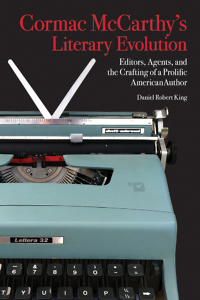Particularly among readers, scholars, and writers in the South, Cormac McCarthy has long been a figure of deep allure. Famously reclusive and stubbornly unwilling to promote his work through book tours or public lectures, McCarthy has developed an image as a solitary aesthete wrapped in a Salinger-esque shroud of monastic devotion to craft and vision. What little the world knows of McCarthy only intensifies the sense that he is some kind of literary Zen master, making a study of mankind’s cruelty to itself and singing it back to us in language of neo-Biblical gravity. Otherworldly novels like Outer Dark and Blood Meridian no doubt owe at least a small part of their power to the legend of the man behind their creation.
 But since the publication of The Road and the release of Ethan and Joel Coen’s film adaptation of No Country for Old Men, McCarthy’s public image has softened somewhat. McCarthy didn’t bother to show up when All the Pretty Horses won the National Book Award in 1992, but he attended the Academy Awards in 2007 when No Country won a slew of awards, including Best Picture and Best Adapted Screenplay. (Upon winning the screenplay Oscar, Ethan Coen reportedly told McCarthy, “Well, I didn’t do anything, but I’m keeping it anyway.”)
But since the publication of The Road and the release of Ethan and Joel Coen’s film adaptation of No Country for Old Men, McCarthy’s public image has softened somewhat. McCarthy didn’t bother to show up when All the Pretty Horses won the National Book Award in 1992, but he attended the Academy Awards in 2007 when No Country won a slew of awards, including Best Picture and Best Adapted Screenplay. (Upon winning the screenplay Oscar, Ethan Coen reportedly told McCarthy, “Well, I didn’t do anything, but I’m keeping it anyway.”)
That same year, McCarthy sat for only the second interview of his career, this time with Oprah Winfrey, who had chosen The Road for her enormously popular Book Club. Somehow the genial gentleman with the close-cropped silver hair and the tweed jacket didn’t square with our image of a dusty stoic shunning his obsessive public to live anonymously, roaming the harsh landscapes of the west and preferring the company of pool-hall hustlers to that of his literary peers. Daniel Robert King’s recently published study, Cormac McCarthy’s Literary Evolution—the first such volume to be published since Texas State University purchased the author’s collected papers—serves to analyze the building of the McCarthy myth and to pull back the curtain, revealing a more human and humane literary wizard.
Cormac McCarthy’s Literary Evolution began as a doctoral dissertation, and while it is indeed a scholarly volume, it reads less like literary analysis than an avid fan’s earnest investigation into how the proverbial sausage of his hero’s great novels was made. As scholarship, the book is perhaps most useful to students in an editing and publishing course, for its purpose is not to analyze or interpret the texts but to debunk the myth of McCarthy as a lonely artist aloof to the machinery of the publishing industry.
 Perhaps most significantly, King presents a detailed account of the relationship between McCarthy and Albert Erskine, his editor at Random House from The Orchard Keeper through Blood Meridian, and the enormous significance of Erskine to McCarthy’s career. Erskine—protégé of Robert Penn Warren, last editor of William Faulkner, and ex-husband of Katherine Ann Porter—is an American literary legend in his own right, and appears to have been more crucial in influencing McCarthy’s talent than the novelist’s legend has suggested.
Perhaps most significantly, King presents a detailed account of the relationship between McCarthy and Albert Erskine, his editor at Random House from The Orchard Keeper through Blood Meridian, and the enormous significance of Erskine to McCarthy’s career. Erskine—protégé of Robert Penn Warren, last editor of William Faulkner, and ex-husband of Katherine Ann Porter—is an American literary legend in his own right, and appears to have been more crucial in influencing McCarthy’s talent than the novelist’s legend has suggested.
King’s study of McCarthy’s correspondence with Erskine and the annotated manuscripts of the novels reveal a far more collaborative enterprise than previously imagined, exposing both a skilled editor’s gentle but shrewd direction and a writer deeply engaged with and receptive to criticism and editorial feedback. Furthermore, King reveals how essential Erskine had been to the marketing and distribution of McCarthy’s work and in helping McCarthy secure advances, awards, and grants so that he might continue to write full-time.
As the volume progresses, King traces two arcs in McCarthy’s career: his decision to abandon Tennessee and turn to the barren landscapes and cruel history of the Southwest, and the changes in the publishing industry as Albert Erskine neared the end of his career. McCarthy (who had worked for most of his career without an agent) became a client of Amanda Urban at ICM, who shepherded his move from Random House’s Erskine to Gary Fisketjon at Knopf, persuaded McCarthy to consent to an interview with The New York Times Magazine, and built the buzz that made All the Pretty Horses a bestseller and brought McCarthy in from the margins of the literary conversation to its white-hot center. In doing so, King illustrates the changing roles and responsibilities of literary editors at the end of the twentieth century and the rising prominence and significance of agents to the cultivation of a writer’s career.
It probably goes without saying that Cormac McCarthy’s Literary Evolution is a niche title. McCarthy’s star seems to have dimmed somewhat in recent years, as admirers of apocalyptic stories have abandoned novels for the likes of Breaking Bad and The Walking Dead, and McCarthy’s own output has slowed and diminished in quality. (The Counselor, anyone?) New readers of McCarthy’s work cannot be seduced by the mystery behind the words, as we who discovered him before he got cozy with Oprah and Hollywood once were.
Still, there seems to be no shortage of McCarthy obsessives (yours truly included), who will read Cormac McCarthy’s Literary Evolution with rapt attention. And anyone curious about the way books have been made and marketed from the last half of the twentieth century to the present—and from first submitted draft to finished product—will benefit enormously from the insights gleaned in this lucid work of literary scholarship.

Ed Tarkington’s debut novel, Only Love Can Break Your Heart, was published by Algonquin Books in January 2016. He lives in Nashville.
Tagged: Cormac McCarthy, Nonfiction





